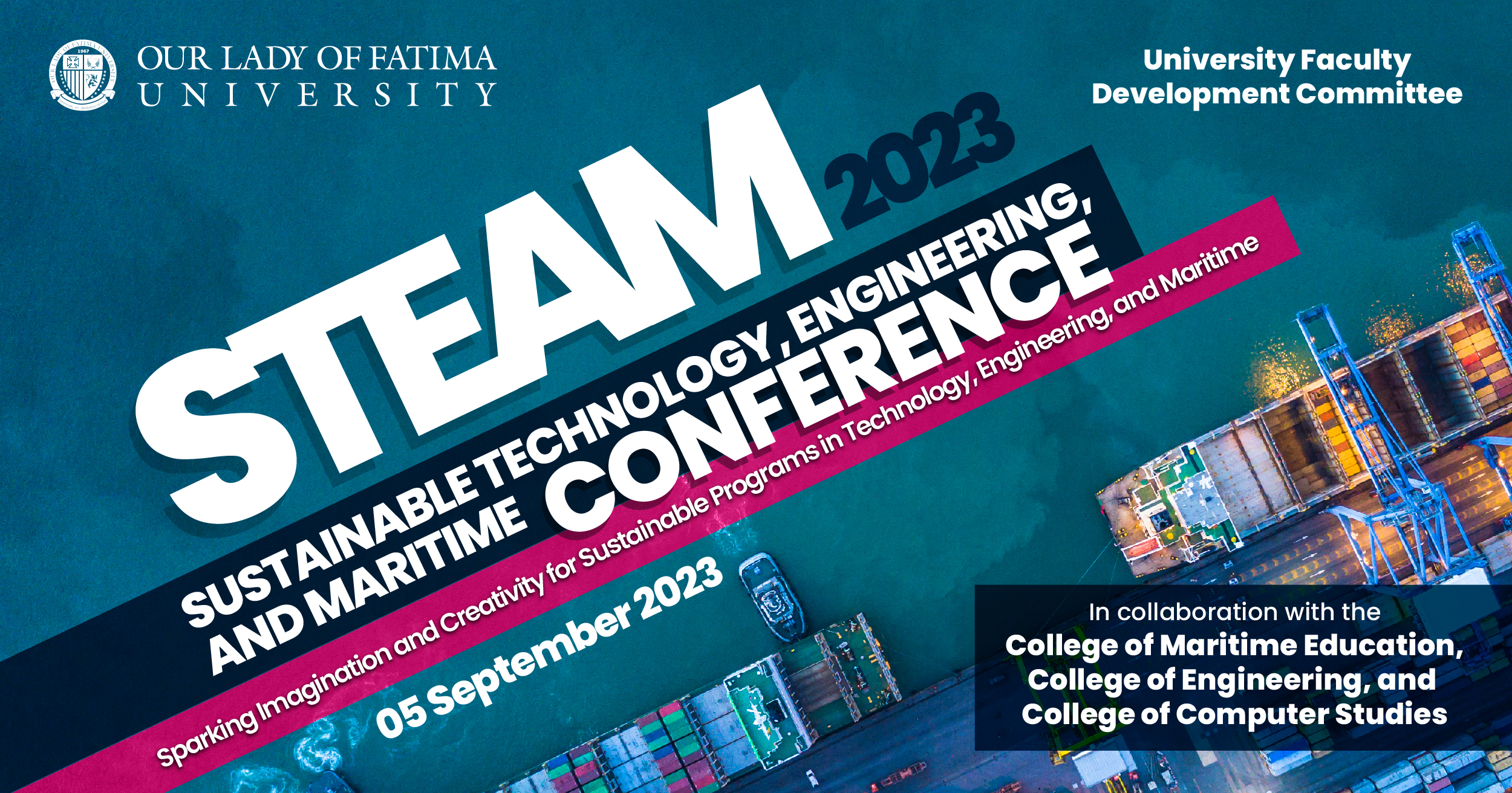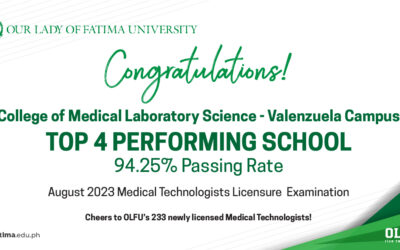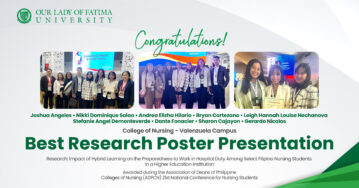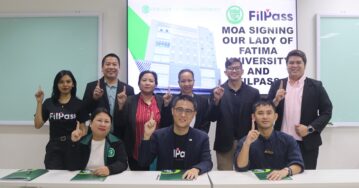As the global industries gear to adapt to the rapid changes of scientific construction, information & communication technology, and naval production, sustainability is the only way forward – this was the central theme that Our Lady of Fatima University (OLFU) strongly advocated in a national conference hosted by the University Faculty Development Committee (UFDC) alongside its partner colleges.
On 5 September 2023, UFDC collaborated with OLFU’s College of Maritime Education (CME), College of Engineering, and College of Computer Studies in bringing forth the Sustainable Technology, Engineering, and Maritime (STEAM) Conference where experts, researchers, operators, and young learners converged via Zoom to anatomize the up-to-date sustainable executions in their key industries.
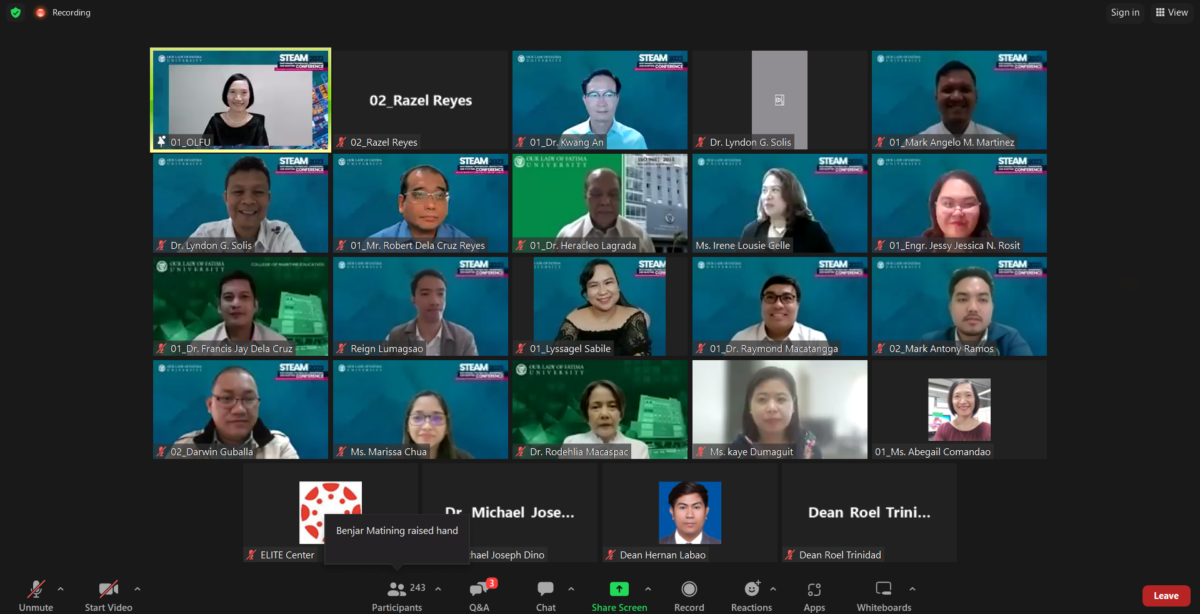
Following a doxology and the singing of the Philippine National Anthem, CME Dean Francis Dela Cruz mapped out the digital assembly with an eloquent opening speech tackling on winning a more sustainable and resilient future posed with unprecedented challenges and opportunities.
In stressing that technology, engineering, and maritime industries play a crucial role in addressing both the perennial and new challenges of the global economy, Dela Cruz proudly boasted the conference to bring the conversation towards innovative and sustainable solutions.
The CME chief went on a brief analysis of the swift technological advancements where he argued that this same progress now calls in earnest attention, specifying the environmental footprint of the digital universe from energy consumption to electronic waste.
“Our industry is grappling with complex sustainability issues and it is our responsibility to lead change towards greener practices. We are here to harness the power of technology, to reduce our environmental impact and reshape our digital world in a way that is sustainable for the generations to come,” he stated.
For Dean Dela Cruz, “sustainability is no longer an option” but a necessity in the engineering industry.
“We are at the precipice of a revolution where our designs, materials, and processes must be reimagined to reduce wastes, increase our efficiency, and use resources wisely,” the dean strongly averred.
The maritime education chief also laid out the testing terrain of the naval landscape, dubbed as the backbone of global trade, in moving towards a sustainable direction.
“The call to reduce emissions, manage wastes, and marine biodiversity is louder than ever. It’s our collective responsibility to answer this call, drive change, and ensure our oceans remain vibrant and healthy for the generations to follow,” Dela Cruz stated as he described the conference as not only an assembly of experts and professionals but a “forum for ideas and an incubator for solutions that will shape” the fundamentals.
While acknowledging the efforts of OLFU administrators, Dela Cruz also recognized Mokpo National Maritime University (MMU) as the institution’s co-host and longtime partner in the quest to embed sustainability disciplines in education.
“Remember every idea, no matter how small, could be the seed of the solution that will transform our industries, and our planet,” the dean declared.
Maritime trends and strategies
To formally set the pace of the digital discourse, Dr. Kwang An of MMU kicked off his keynote speech with a weighty run-through on maritime global trends.
In citing a research, the Korean expert presented the naval industry with the emerging technologies as the “state of the future” along with determined areas in mega urbanization, demographic change, and even accelerating technological dynamics.
The maritime academic went on assessing the fifteen global challenges in the hope to diagnose the prospects for humanity where sustainable development and climate change emerged as the major concern among fourteen others.
For the technology sector, Dr. An identified promising technologies that could impact the general society in no time, to wit: artificial intelligence (AI), 5G, robot, personalized medicine, and autonomous driving.
In referencing the roadmap of the International Maritime Organization (IMO), the group’s strategic direction highlighted responsible shipping practices especially in keeping a track on marine and atmospheric pollutants by ships.
Expanding his discussion, Dr. An further shared with the audience the maritime trends under corresponding domains covering society, technology, economy, environment, and policy-making.
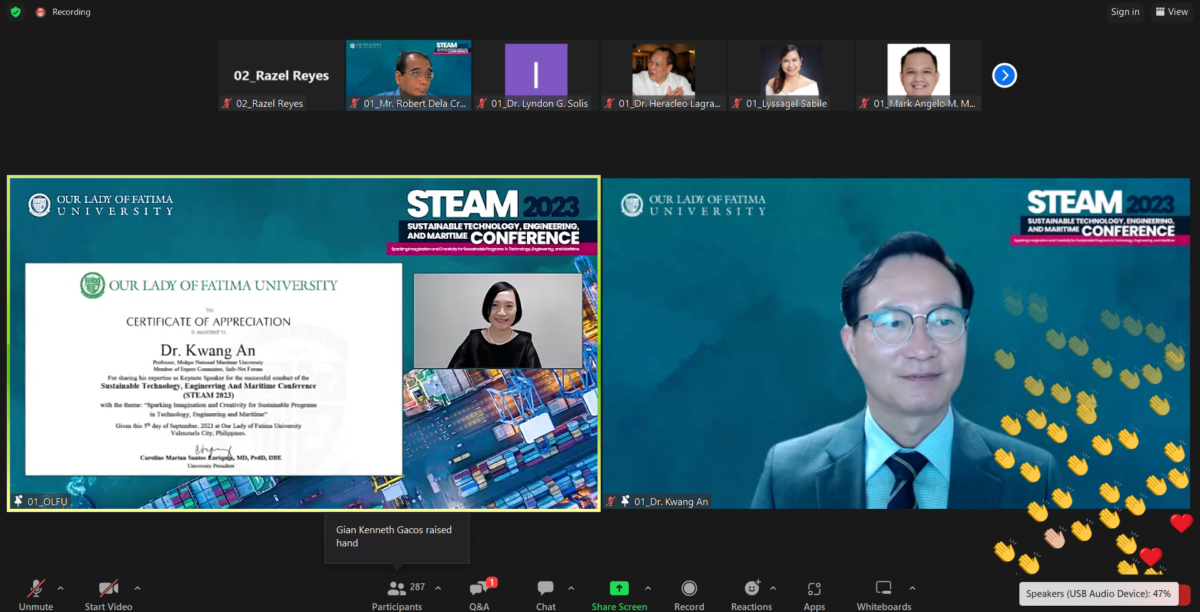
With the seemingly boundless power of technology, the trend in the maritime field is predicted to produce never-before-seen vessels including those unmanned and green ships, as well as the emergence of maritime cyber security by 2050.
The naval expert also presented the practices of the United Kingdom and Australia in their well-founded maritime industries in coming up with strategic proposals to navigate these trends by advocating ship safety, eco-friendly ships, maritime traffic management, and maritime industry support.
Emerging technologies and their impact on the ICT industries
In his discussion, tech expert and columnist Robert Dela Cruz Reyes explored the potentially impactful and latest tech innovations in the market which include Internet of Things (IoT), 5G, augmented reality (AR), virtual reality (VR), artificial intelligence (AI), robotics, automation, and quantum computing.
The Manila Bulletin commentator broadened his part with a comprehensive analysis of the ever-transforming roles of technologies among leading sectors involving healthcare, finance, manufacturing, and entertainment.
While the polarized public opinion towards up-and-coming tech devices including AI is relatively evident, Reyes primarily focused on the good side of the tool by presenting its extensive contribution in revamped industries, and in human lifestyle in general.
The tech executive himself also went on to recognize the challenges and risks of powerful technologies as constantly raised by scholars and policy-makers across the globe. These include the unsettling plights that pose threat and could upend human race in terms of security and privacy, ethical standards, environmental protection, disruption and economic shifts, public perception and trust, resource allocation, investment risks, among others.
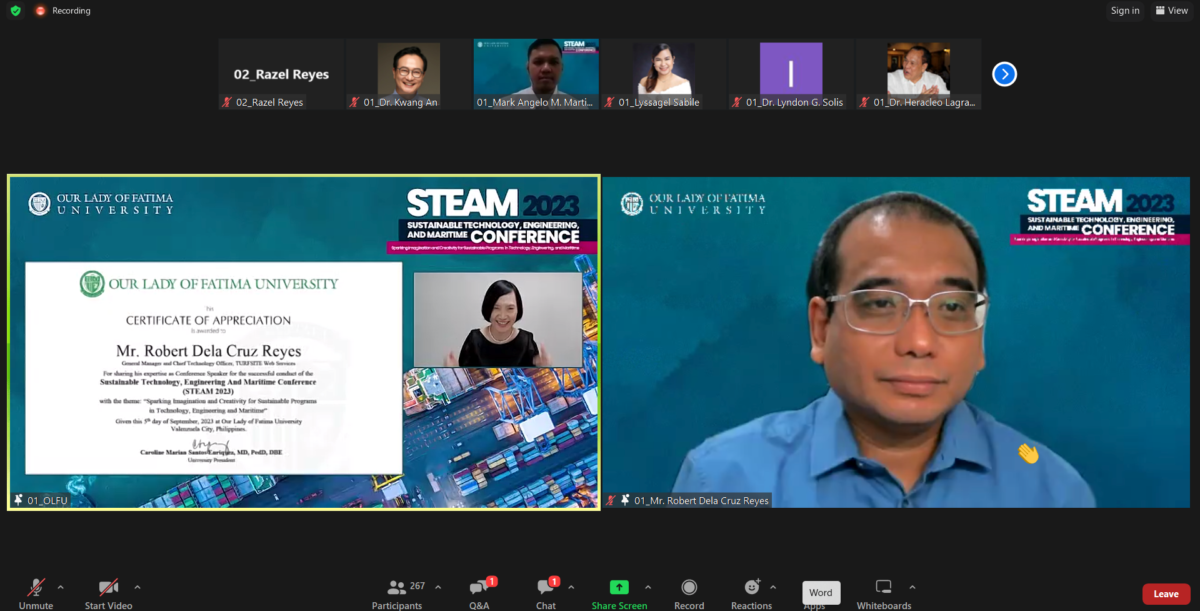
To dive deeper into the subject, Reyes proceeded to examine the opportunities for innovation in the industry that would harness vast amounts of possibilities in shaping a tech-ready global community.
It is interesting to note among the trends that were identified, Reyes is also anticipating more stringent regulations and ethical framework around AI technology to respond to the concerns on bias, fairness and transparency.
The growth of energy-efficient and sustainable data centers is likewise projected to address emerging environmental concerns. Finally, telemedicine solutions and remote patient monitoring are also predicted to maximize innovation in the coming years.
Innovations on construction materials
Vice President for Planning, Innovation, Linkages, Land and Agroecological Research for Development at Pampanga State Agricultural University (PSAU) Dr. Lyndon Solis presented an ongoing research on innovation in construction materials with his paper investigating engineered bamboo.
The agri-researcher carried the discussion focusing on the strategic science and technology plan of the bamboo industry where proposed and on-going initiatives are conjoined to arrive at best production practices.
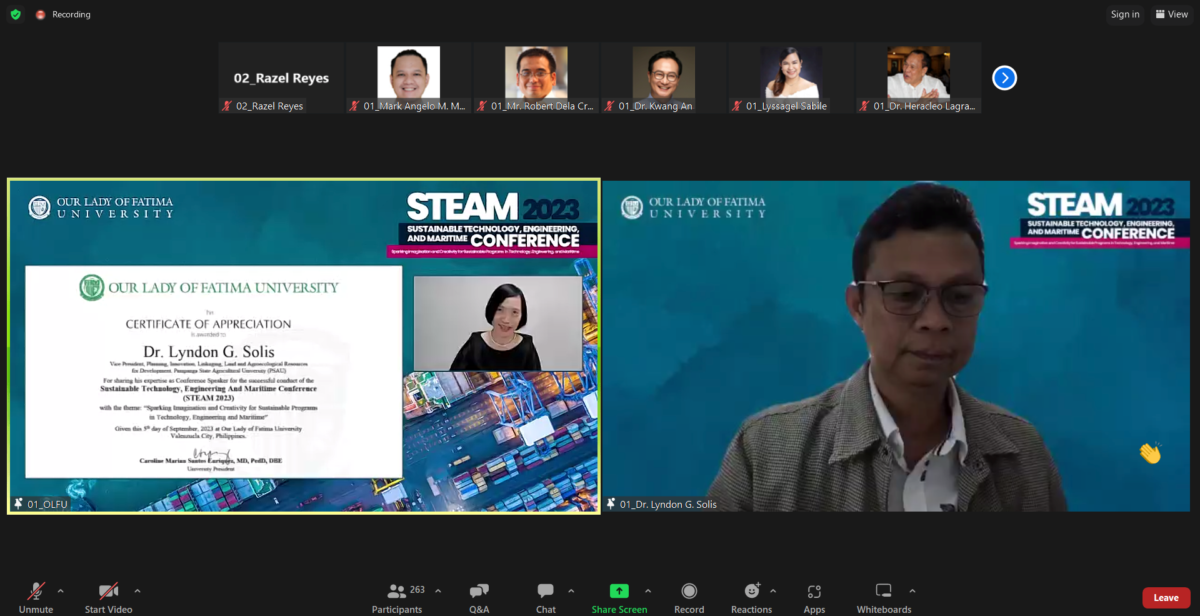
In eyeing to release a low-cost substitute produced from bamboo, the engineered material is seen to be a replacement for wood or engineered wood. While the building standards have not been agreed on to this day, engineered bamboo is already promising with its vast potential in the market to function as vertical, horizontal and strand woven flooring; decking; veneer; cladding; T-moulding; baseboard, among many others.
Finally, to zero in on the innovative implementation of sustainability, Solis proudly flexed the benefits of engineered bamboo by laying out its eco-friendly components, convenience, pro-health properties, durability, climatic resilience, and cost effectiveness.
Sustainability and environmental challenges in shipbuilding in the Philippines
To examine sustainability in the context of shipbuilding, Registered Naval Architect and Marine Engineer Jessy Jessica Rosit, immediately tried to simplify the spectrum of practices that aim at mitigating the ecological footprint of the vital field. These green exercises include the adoption of eco-friendly technologies, the use of recycled materials and the creation of energy-efficient design.
While the call for environment-friendly shipbuilding in the country remains urgent, challenges stand in the way of attaining a more sustainable movement of the industry involving compliance with emission regulations, innovating workforce skills, and waste management disposal.
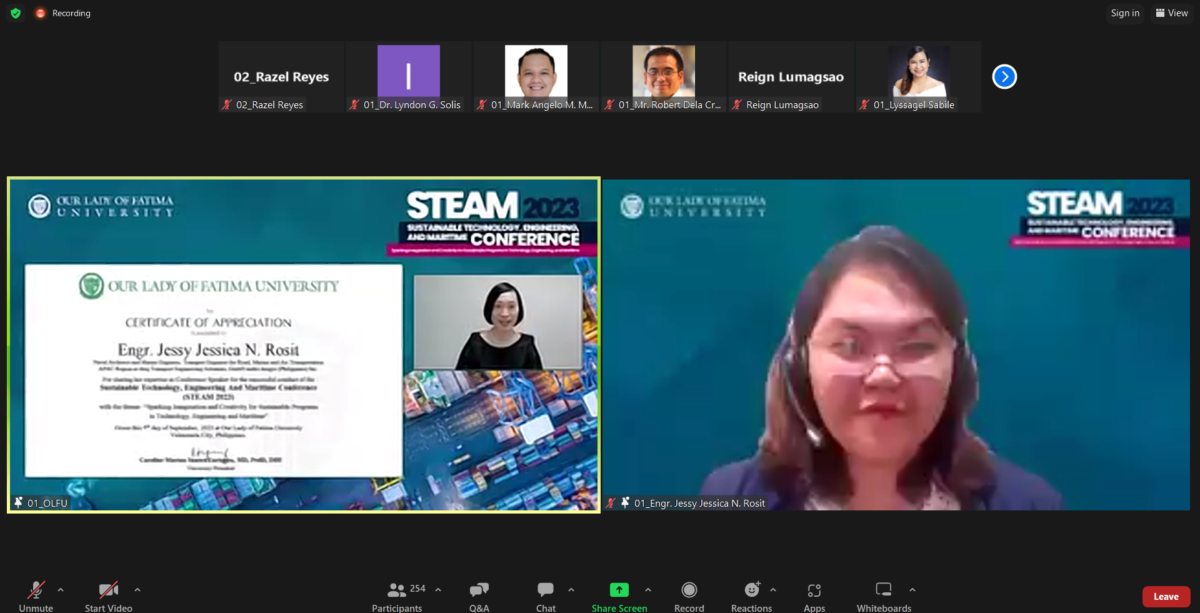
Supplementing the intensive discussions with a forum
The nearly two-hour long discussion was followed by yet another in-depth discourse with an open forum. For Reyes, the tech columnist was asked about the supposed moratorium of AI because of “its negative impact in the society like job displacement” to which he immediately disagreed.
“I don’t think AI or the use of AI and the development of it should have a moratorium. It’s simply that practical. I would support the government and for the private sector to have AI regulated instead,” he said while positively viewing the power of AI.
In a progressive take, Reyes also argued that the tool is not a threat but an opportunity, also believing that AI “will not take away our jobs.”
Jumping to another area, Dr. Solis eloquently responded to a question regarding the comprehensive flexural and shear strength of the engineered bamboo, further testifying for the scientific reliability of the construction material.
For Engr. Rosit, the naval expert, answered challenging questions on the compliance of shipbuilding in the country to the International Convention for the Prevention of Pollution from Ships (MARPOL) as well as the direction of the Philippine Ships Registry in gearing towards sustainability.
Giving away some of his country’s top secrets as one of the leading global shipbuilding powerhouses, Dr. An itemized the working elements behind South Korea’s massive shipbuilding industry including the application of information and communication technology in the industry, the collaboration of shipping and shipbuilding societies, and the country’s supportive government.
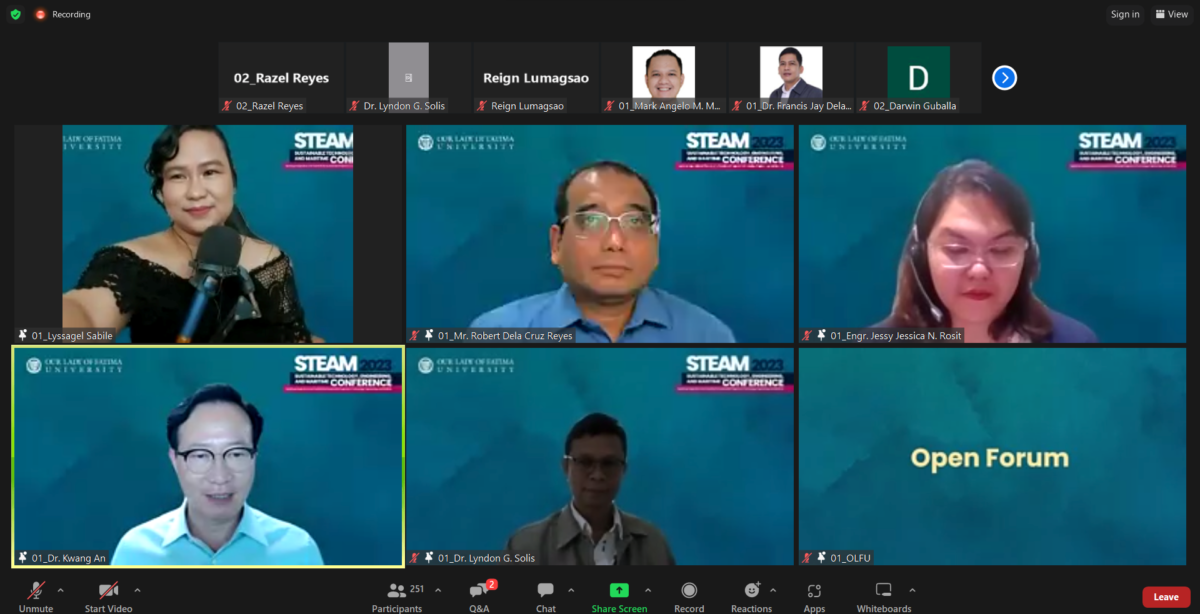
On a more academic note, the forum went back to diagnose AI where Dr. Reyes was asked for his advice to learning institutions “using AI at the forefront of the academic landscape.”
“The university or the institution needs to check first what would be the use of AI to their advantage. By embracing AI strategically and responsibly, institutions like universities cannot only stay competitive but also lead in shaping the future of education, research and innovation,” he confidently suggested, adding that the key is to “determine first what would be the role of AI” in an academic space.
In wrapping up the extensive discussion, Vice President for Academic Affairs Dr. Heracleo Lagrada rendered an articulate outline of the keynote and plenary talks, also acknowledging the unparalleled collaboration of the teams behind the national conference that would conclude as a resonating success.
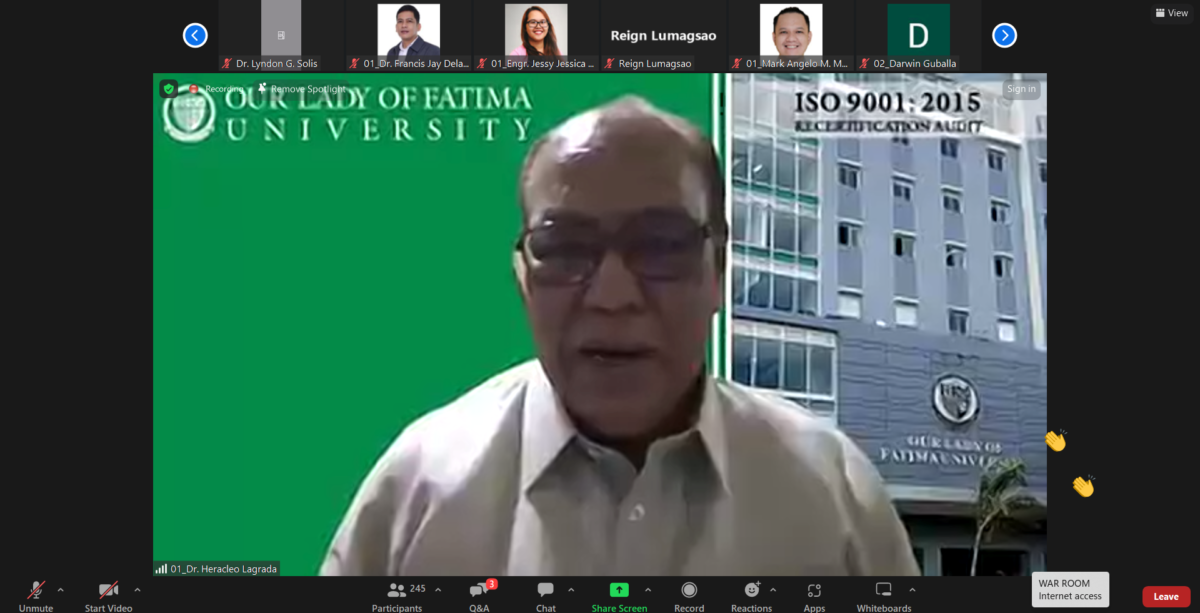
College deans headed by CME’s Dr. Dela Cruz, College of Engineering’s Engr. Mark Martinez, and College of Computer Studies’ Dr. Raymond Macatangga, along with OLFU’s head of offices including Center for Professional Development and Academic Partnership (CPDAP) Manager Dr. Rodehlia Macaspac and Marketing Manager Irene Louise Gelle, among many others who contributed towards the fruition of the digital conference or who participated as delegates.
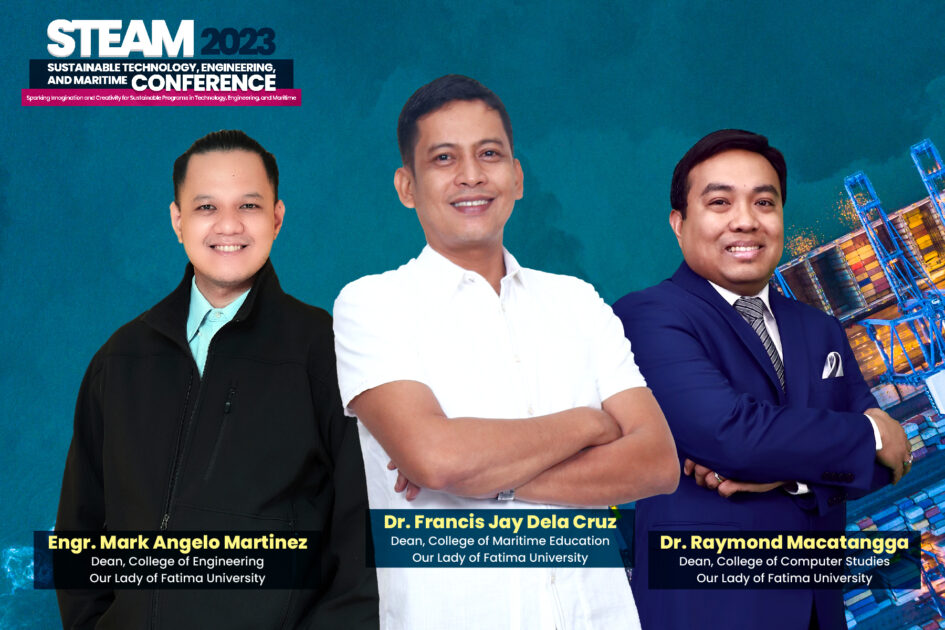
Practical Coordinator for OLFU’s College of Computer Studies Abegail Comandao commanded the flow of the program as the presenter of the high-yielding STEAM.
STEAM was made possible through the able leadership of Dr. Francis Jay Dela Cruz as conference chair. — Raymond Lumagsao
